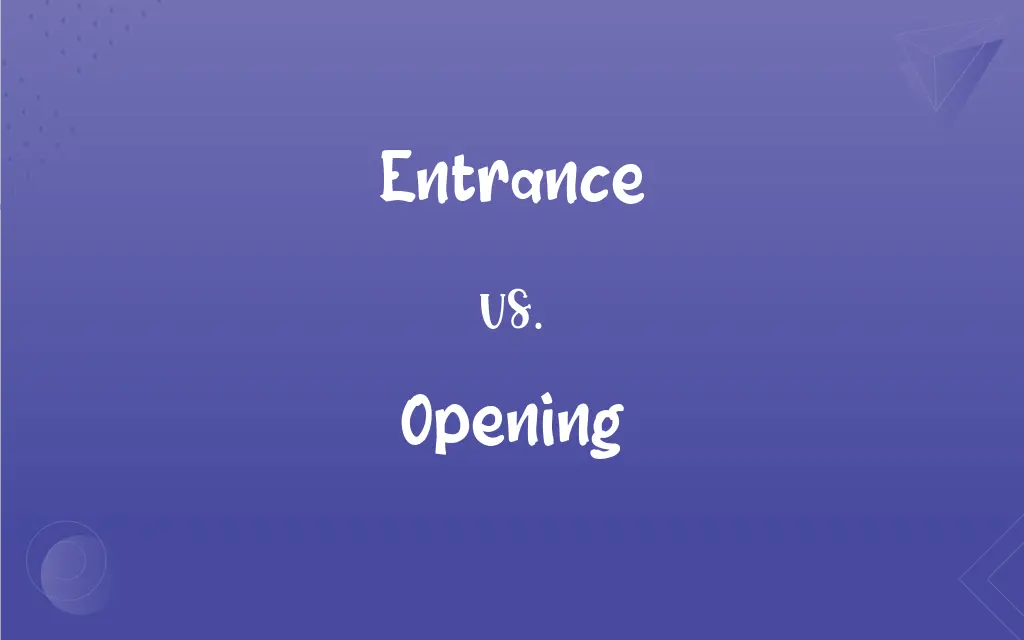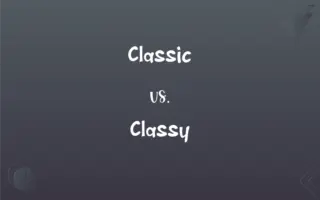Entrance vs. Opening: What's the Difference?
Edited by Aimie Carlson || By Janet White || Updated on October 3, 2023
"Entrance" primarily refers to a place of entry, like a door, whereas "Opening" is a more general term, referring to any gap or space allowing access. Both convey access points but differ in specificity and context.

Key Differences
The terms "Entrance" and "Opening" both represent points of access, but they have nuances that set them apart. "Entrance" typically refers to a structured point of access or entry, such as a door or gateway, often in buildings or rooms. It implies a defined and intentional space created for entering. In contrast, "Opening" denotes any space or gap that allows access, and it is a broader term. An "Opening" could be a hole, a break, or a space in any surface or enclosure and does not necessarily denote intentionality or design like "Entrance" does.
When considering the context of usage, "Entrance" is mostly used in architectural, residential, or commercial contexts to describe designed entry points like doors or gates. "Opening," on the other hand, is versatile in its application and can describe natural gaps, breaks, or spaces in various contexts, not limited to architecture or design. For instance, one could refer to an "Opening" in the trees or an "Opening" in a conversation, but using "Entrance" in such contexts would be inappropriate.
The connotation of "Entrance" often carries a degree of formality and permanence, implying a structured and established point of entry, often marked and recognizable. It has a specialized use, specifically indicating a point where one may enter. On the contrary, "Opening" can convey a more temporary, flexible, or informal access point. It can represent any breach or gap, whether it’s intended for access or just exists as a break in a continuous surface. The "Opening" in a wall, for instance, might be accidental or deliberate and may or may not serve as a point of entry.
Reflecting on the application in sentences, "Entrance" would be apt when referring to a formal or designated entry point, such as "the entrance to the building," highlighting its structured and intended nature for access. In contrast, "Opening" could be used in a variety of situations to represent gaps or spaces, like "an opening in the clouds," emphasizing its versatility and application to any situation where there’s a break or gap allowing access or passage, whether intentional or not.
Comparison Chart
Context of Use
Mostly architectural, structured points of entry.
Versatile, used to describe any gap allowing access.
ADVERTISEMENT
Connotation
Formal, permanent, and intentional.
Can be informal, temporary, or unintentional.
Specificity
Specific to designed points of entry.
Broad, can be any gap, break, or space.
Application
Applies to doors, gates, or structured entry points.
Applies to any accessible gap or space, intentional or not.
Flexibility
Less flexible, mostly used for structured entry points.
Highly flexible, used in varied contexts.
Entrance and Opening Definitions
Entrance
A point or place of entering.
The museum has a grand entrance.
ADVERTISEMENT
Opening
The act or an instance of becoming open or being made to open
The opening of the tomb.
Entrance
The right, means, or opportunity to enter.
Entrance to the club is restricted.
Opening
A gap, breach, or aperture
Slipped through an opening in the hedge.
Entrance
The coming of an actor on stage.
The audience clapped at his entrance.
Opening
A clearing in the woods.
Entrance
The act or an instance of entering.
Opening
The first part or stage, as of a book.
Entrance
A means or point by which to enter.
Opening
The first performance
The opening of a play.
Entrance
Permission or power to enter; admission
Gained entrance to medical school.
Opening
A formal commencement of operation
Attended the opening of the new museum.
Entrance
The point, as in a musical score, at which a performer begins.
Opening
A specific pattern or series of beginning moves in certain games, especially chess.
Entrance
The first entry of an actor into a scene.
Opening
An opportunity affording a chance of success.
Entrance
(Nautical) The immersed part of a ship's hull forward of the middle body.
Opening
An unfilled job or position; a vacancy.
Entrance
To put into a trance.
Opening
Present participle of open
Entrance
To fill with delight, wonder, or enchantment
A child who was entranced by a fairy tale.
Opening
Pertaining to the start or beginning of a series of events.
The opening theme of Beethoven's Fifth Symphony is, perhaps, the most recognizable in all of European art music.
The opening act of the battle for Fort Sumter was the firing of a single 10-inch mortar round from Fort Johnson at 4:30 a.m. on April 12, 1861, by Lt. Henry S. Farley, who acted upon the command of Capt. George S. James, which round exploded over Fort Sumter as a signal to open the general bombardment from 43 guns and mortars at Fort Moultrie, Fort Johnson, the floating battery, and Cummings Point.
Entrance
(countable) The action of entering, or going in.
Her entrance attracted no attention whatsoever.
Opening
(cricket) describing the first period of play, usually up to the fall of the first wicket; describing a batsman who opens the innings or a bowler who opens the attack
Entrance
The act of taking possession, as of property, or of office.
The entrance of an heir upon his inheritance, or of a magistrate into office
Opening
An act or instance of making or becoming open.
The daily openings of the day lily bloom gives it its name.
He remembered fondly the Christmas morning opening of presents.
Entrance
(countable) The place of entering, as a gate or doorway.
Place your bag by the entrance so that you can find it easily.
Opening
A gap permitting passage through.
A salamander darted out of an opening in the rocks.
He slipped through an opening in the crowd.
Entrance
(uncountable) The right to go in.
You'll need a ticket to gain entrance to the museum.
To give entrance to friends
Opening
An act or instance of beginning.
There have been few factory and store openings in the US lately.
Their opening of the concert with Brass in Pocket always fires up the crowd.
Entrance
The entering upon; the beginning, or that with which the beginning is made; the commencement; initiation.
A difficult entrance into business
Opening
Something that is a beginning.
Entrance
The causing to be entered upon a register, as a ship or goods, at a customhouse; an entering.
His entrance of the arrival was made the same day.
Opening
The first performance of a show or play by a particular troupe.
They were disappointed at the turnout for their opening, but hoped that word would spread.
Entrance
(nautical) The angle which the bow of a vessel makes with the water at the water line.
Opening
The initial period when a show at an art gallery or museum is first opened, especially the first evening.
Entrance
(nautical) The bow, or entire wedgelike forepart of a vessel, below the water line.
Opening
The first few measures of a musical composition.
Entrance
(music) The beginning of a musician's playing or singing; entry.
Opening
The first few moves in a game.
John spends two hours a day studying chess openings, and another two hours studying endgames.
Entrance
(transitive) To delight and fill with wonder.
The children were immediately entranced by all the balloons.
Opening
A vacant position, especially in an array.
Are there likely to be any openings on the Supreme Court in the next four years?
Entrance
(transitive) To put into a trance.
Opening
A time available in a schedule.
If you'd like to make a booking with us, we have an opening at twelve o'clock.
The only two-hour openings for the hockey rink are between 1AM and 5AM.
Entrance
The act of entering or going into; ingress; as, the entrance of a person into a house or an apartment; hence, the act of taking possession, as of property, or of office; as, the entrance of an heir upon his inheritance, or of a magistrate into office.
Opening
An unoccupied employment position.
We have an opening in our marketing department.
Entrance
Liberty, power, or permission to enter; as, to give entrance to friends.
Opening
An opportunity, as in a competitive activity.
Entrance
The passage, door, or gate, for entering.
Show us, we pray thee, the entrance into the city.
Opening
(math) In mathematical morphology, the dilation of the erosion of a set.
Entrance
The entering upon; the beginning, or that with which the beginning is made; the commencement; initiation; as, a difficult entrance into business.
St. Augustine, in the entrance of one of his discourses, makes a kind of apology.
Opening
The act or process of opening; a beginning; commencement; first appearance; as, the opening of a speech.
The opening of your glory was like that of light.
Entrance
The causing to be entered upon a register, as a ship or goods, at a customhouse; an entering; as, his entrance of the arrival was made the same day.
Opening
A place which is open; a breach; an aperture; a gap; cleft, or hole.
We saw him at the opening of his tent.
Entrance
The angle which the bow of a vessel makes with the water at the water line.
Opening
An opportunity; as, an opening for business.
Entrance
To put into a trance; to make insensible to present objects.
Him, still entranced and in a litter laid,They bore from field and to the bed conveyed.
Opening
A vacant place; a job which does not have a current occupant; as, they are now interviewing candidates for the two openings in the department.
Entrance
To put into an ecstasy; to ravish with delight or wonder; to enrapture; to charm.
And I so ravished with her heavenly note,I stood entranced, and had no room for thought.
Opening
A thinly wooded space, without undergrowth, in the midst of a forest; a clearing; as, oak openings.
Entrance
Something that provides access (entry or exit);
They waited at the entrance to the garden
Beggars waited just outside the entryway to the cathedral
Opening
An open or empty space in or between things;
There was a small opening between the trees
The explosion made a gap in the wall
Entrance
A movement into or inward
Opening
A ceremony accompanying the start of some enterprise
Entrance
The act of entering;
She made a grand entrance
Opening
Becoming open or being made open;
The opening of his arms was the sign I was waiting for
Entrance
Attract; cause to be enamored;
She captured all the men's hearts
Opening
The first performance (as of a theatrical production);
The opening received good critical reviews
Entrance
Put into a trance
Opening
The act of opening something;
The ray of light revealed his cautious opening of the door
Entrance
An act or instance of going or coming in.
His entrance was met with applause.
Opening
Opportunity especially for employment or promotion;
There is an opening in the sales department
Entrance
A space or way for entering.
The building has a narrow entrance.
Opening
The initial part of the introduction;
The opening established the basic theme
Opening
A possible alternative;
Bankruptcy is always a possibility
Opening
An aperture or hole opening into a bodily cavity;
The orifice into the aorta from the lower left chamber of the heart
Opening
A vacant or unobstructed space that is man-made;
They left a small opening for the cat at the bottom of the door
Opening
An entrance equipped with a hatch; especially a passageway between decks of a ship
Opening
The first of a series of actions;
He memorized all the important chess openings
Opening
First or beginning;
The memorable opening bars of Beethoven's Fifth
The play's opening scene
Opening
A space or gap that allows access.
The cat slipped through the opening in the fence.
Opening
An opportunity to achieve something.
The job provides an opening for career advancement.
Opening
The first part or stage of an event.
The opening of the ceremony was spectacular.
Opening
An act of making a space or gap.
The opening in the wall was deliberate.
Opening
The initial stage of a process.
The opening negotiations were tough.
FAQs
Do "Entrance" and "Opening" have the same meaning?
They have similar meanings but differ in context, specificity, and formality.
Is "Entrance" more formal?
Yes, "Entrance" generally has a more formal and structured connotation.
Can "Opening" represent a break in a surface?
Yes, "Opening" can represent any break or gap in a continuous surface.
Is "Entrance" specific to architecture?
It is commonly used in architectural contexts but not exclusively so.
Can "Opening" refer to any gap or space?
Yes, "Opening" can refer to any gap or space allowing access.
Can "Entrance" refer to the act of entering?
Yes, it can refer to both the act of entering and the place of entry.
Can "Opening" be informal?
Yes, it can convey a more informal and temporary access point.
Can "Opening" denote an opportunity?
Yes, "Opening" can also represent an opportunity or a starting point.
Can "Opening" be used more broadly than "Entrance"?
Yes, "Opening" has a broader, more versatile application.
Can "Opening" be an initial stage of an event?
Yes, it can represent the initial stage or the commencement of an event.
Is "Entrance" always intentional?
It typically implies intentionality and design but not necessarily always.
Is "Entrance" a structured point of entry?
Typically, it refers to a structured and designed point of entry.
Does "Entrance" always imply permanence?
It often implies a degree of permanence, but context is crucial.
Can "Opening" be a natural gap?
Yes, it can represent natural gaps or breaks in surfaces or enclosures.
Is "Entrance" used in performing arts?
Yes, it’s used to denote an actor’s appearance on stage.
About Author
Written by
Janet WhiteJanet White has been an esteemed writer and blogger for Difference Wiki. Holding a Master's degree in Science and Medical Journalism from the prestigious Boston University, she has consistently demonstrated her expertise and passion for her field. When she's not immersed in her work, Janet relishes her time exercising, delving into a good book, and cherishing moments with friends and family.
Edited by
Aimie CarlsonAimie Carlson, holding a master's degree in English literature, is a fervent English language enthusiast. She lends her writing talents to Difference Wiki, a prominent website that specializes in comparisons, offering readers insightful analyses that both captivate and inform.































































